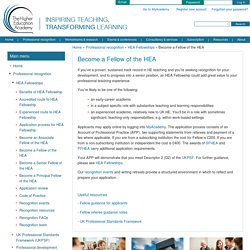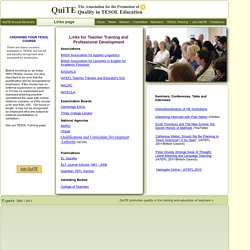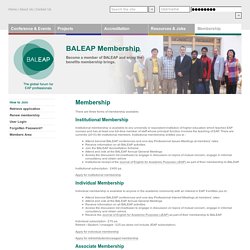

Become a Fellow of the HEA. If you’ve a proven, sustained track record in HE teaching and you’re seeking recognition for your development, and to progress into a senior position, an HEA Fellowship could add great value to your professional teaching experience.

You’re likely to be one of the following: an early-career academicin a subject-specific role with substantive teaching and learning responsibilitiesan experienced academic, relatively new to UK HE. You’ll be in a role with sometimes significant, teaching-only responsibilities; e.g. within work-based settings Applicants may apply online by logging into MyAcademy. The application process consists of an Account of Professional Practice (APP), two supporting statements from referees and payment of a fee where applicable. Your APP will demonstrate that you meet Descriptor 2 (D2) of the UKPSF. Blackboard Learn. Teacher Training and Education SIG, IATEFL.
News. Ofqual. NARIC - UK NARIC. NATECLA - Home. NALDIC. NALDIC. Evaluation and Accreditation of Quality in Language Services. Where clarity is lacking in English language teaching. Quality in TESOL Education (QuiTE), a UK-based association that brings together English language teaching professionals, wants to know why and how people enter the profession.

The initial research it has carried out suggests that entrants into ELT are often confused by the information that is available and are making poorly informed judgments about the training courses they choose. There is a wide range of initial training courses on offer in the UK, from the respected Trinity CertTesol and Cambridge Esol Celta qualifications to short online or weekend courses, many of which do not include formal observation of teaching skills.
David Phillips, who recently completed a 120-hour certificate course, would have benefited from easily accessible and independent information before he chose his course. "There is a bewildering number of courses and acronyms in the ESL/EFL world. I struggled to understand what the difference was between them, which was to my cost in the end," said Phillips. Links. Before enrolling on an initial TEFL/TESOL course, it is very important to be sure that the qualification will be recognised by employers.

If the course has no external supervision or validation, or if it has no supervised and assessed teaching practice (sometimes the case with online/ distance courses), or if the course is for less than 100 - 120 hours in length, it may not be recognised by employers who are subject to external accreditation or validation. See our TESOL Training page. QuiTE Homepage. BALEAP - The Global Forum for EAP Professionals. There are three forms of membership available.

Institutional Membership Institutional membership is available to any university or equivalent institution of higher education which teaches EAP courses and has at least one full-time member of staff whose principal function involves the teaching of EAP. There are currently (2010) 86 institutional members. Institutional membership entitles you to : BALEAP - The Global Forum for EAP Professionals. Teaching English as a Foreign Language. Teaching English as a Foreign Language (TEFL) involves teaching English, either in the UK or overseas, to students whose first or main language is not English.

It may also be referred to as TESOL, Teaching English to Speakers of Other Languages, when the students are in the UK. There are also jobs in TESL, teaching English as a Second Language, which refers specifically to language teaching for immigrants to English speaking countries. There is also growing demand for English for Specific Purposes (ESP) teachers, who specialise in teaching English in areas such as business, tourism, medicine, the law or engineering. Demand for English language teachers is high, with opportunities in both the private and public sectors.
Iatefl.org. ATL. Association of Teachers and Lecturers: the education union. Teacher Solidarity. The NUT is committed to supporting people around the world in their struggle to achieve decent education, employment, freedom from persecution and discrimination and the right to a say in how they are governed.

These development issues are an integral and historic part of the trade union movement’s commitment to global solidarity. Our development work is divided into four areas: The NUT lobbies and campaigns for broad development issues like more and better aid for developing countries or the cancellation of debt. Much of this work is done in partnership with other organisations such as international trade union bodies or non-governmental organisations. The NUT supports teachers’ unions across the developing world on capacity building and sharing skills. International Solidarity Teachers around the world are facing privatisation, performance-related pay, cuts and attacks on their professionalism.
Four Pillars There are four pillars to the NUT’s international solidarity work. Teacher Solidarity. Education in almost every country in the world is subject to the grip of neo-liberal education 'reform' which is slowly starving out public schooling, promoting privatisation, destroying teacher professionalism and aims only to produce a minimally educated workforce, which can read instructions and advertisements but is discouraged from thinking critically about the world.

Teachersolidarity is an independent website which records the resistance to such reform of teachers, their unions, communities and researchers, who are fighting to defend public and democratic education. It aims to bring such people together, through sharing experiences, learning from one another and giving and receiving solidarity. We welcome articles, information and requests for solidarity from those involved in the struggle anywhere in the world.